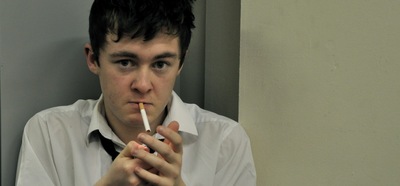Gotcha, Jagged Fence at Riverside Studios
reviewed for The Spectator, 14 March 2011

Jake Roche as The Kid
It sometimes feels as if there has never been as much despair over the state of our education system as there is today. Despite the capacity of the Royal Wedding to awaken our heaviest-breathing collective fantasies of a return to serfdom, as we all excitedly queue up to shake the hand and curtsey to a sweet, nice girl lucky enough to marry a sweet, nice man lucky enough to emerge from a womb lucky enough to live in Kensington Palace, our governments repeatedly make the claim that Britain is, at its best, a meritocracy.
It sometimes feels as if there has never been as much despair over the state of our education system as there is today. Despite the capacity of the Royal Wedding to awaken our heaviest-breathing collective fantasies of a return to serfdom, as we all excitedly queue up to shake the hand and curtsey to a sweet, nice girl lucky enough to marry a sweet, nice man lucky enough to emerge from a womb lucky enough to live in Kensington Palace, our governments repeatedly make the claim that Britain is, at its best, a meritocracy. But it gets hard to keep believing, when the chances of UK children making a better life for themselves than their parents remains near the lowest in the developed world.
Watching JaggedFence’s raw, angry revival of Barrie Keefe’s 1976 polemic, Gotcha, it is difficult to know whether to feel depressed or reassured by the reminder that there’s nothing new in complaining that education has gone to the dogs. What is clear, however, is that the unnerving rage unleashed by the production’s young star, an impressive Jake Roche, gives life to one of the most convincing contemporary accounts out there of the psychological scars that still mark today’s educational failures. The Labour government and the Coalition have both tried to claim for themselves the cause of social mobility, with their competing approaches to opening up access to education. (That ‘social mobility’ implies descent, as well as ascent, does not tend to feature in the power-point presentations). Yet, for all this welcome concern about social exclusion amongst the younger generation, many of the most well-meaning are driven by fear of the people they supposedly want to help.
Exemplifying this attitude, David Starkey recently defended his much-criticised attempt to teach on Jamie Oliver’s Dream School, lamenting that ‘the violence that can be witnessed on our streets is also to be found bubbling under the surface in the classroom.’ For all Starkey’s fears, the teenagers on Dream School barely seem as dangerous as Gotcha’s schoolboy, whose breakdown finds him threatening to blow himself up a room full of misbehaving teachers.
But they speak of the same disenfranchisement that Keefe predicted 30 years ago, the same sense of being lost in the muddle and size of a comprehensive school, and they share with Gotcha’s protagonist the same refusal to take responsibility for their own failures, an insistence that the comprehensive system, in promising opportunity to those of all abilities, has failed them, instead of the other way around. In giving voice to a character who barely even knows how to be articulate, Jake Roche marks himself out as a major young talent to watch. He is helped by strong support from David Morley Hall as his nervous headmaster, although Emily Dobbs and Jefferson Hall struggle with the lack of subtlety with which Keefe has scripted their adulterous relationship and accompanying storeroom hanky-panky. It falls to Dobbs, in particular, to carry the impetus of Keefe’s unconvincing ending, a situation that is not helped by her rather mannered style.
Where Keefe’s script seriously impresses, however, is in the sheer range of educational issues it packs into a mere hour’s run, and the sophistication with which it weighs every nuance of the argument. Powered by Roche’s high-octane performance, Gotcha marks one of theatre’s most exciting contributions to the education debate in recent years.




